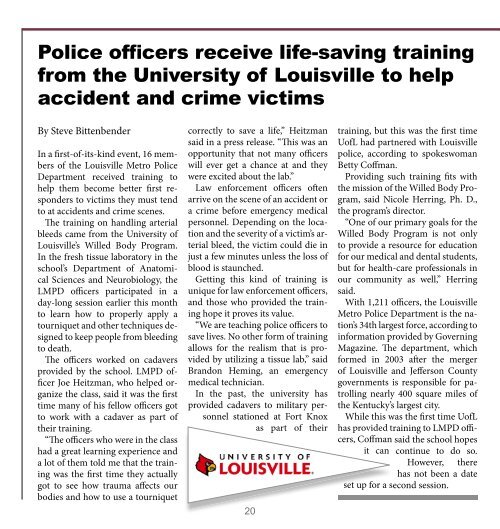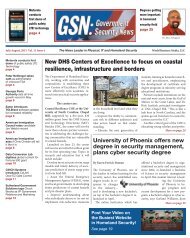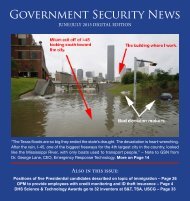October/November 2015 Digital Edition
Create successful ePaper yourself
Turn your PDF publications into a flip-book with our unique Google optimized e-Paper software.
Police officers receive life-saving training<br />
from the University of Louisville to help<br />
accident and crime victims<br />
by Steve bittenbender<br />
in a first-of-its-kind event, 16 members<br />
of the louisville metro Police<br />
Department received training to<br />
help them become better first responders<br />
to victims they must tend<br />
to at accidents and crime scenes.<br />
The training on handling arterial<br />
bleeds came from the University of<br />
louisville’s Willed body Program.<br />
in the fresh tissue laboratory in the<br />
school’s Department of anatomical<br />
Sciences and Neurobiology, the<br />
lmPD officers participated in a<br />
day-long session earlier this month<br />
to learn how to properly apply a<br />
tourniquet and other techniques designed<br />
to keep people from bleeding<br />
to death.<br />
The officers worked on cadavers<br />
provided by the school. lmPD officer<br />
Joe Heitzman, who helped organize<br />
the class, said it was the first<br />
time many of his fellow officers got<br />
to work with a cadaver as part of<br />
their training.<br />
“The officers who were in the class<br />
had a great learning experience and<br />
a lot of them told me that the training<br />
was the first time they actually<br />
got to see how trauma affects our<br />
bodies and how to use a tourniquet<br />
correctly to save a life,” Heitzman<br />
said in a press release. “This was an<br />
opportunity that not many officers<br />
will ever get a chance at and they<br />
were excited about the lab.”<br />
law enforcement officers often<br />
arrive on the scene of an accident or<br />
a crime before emergency medical<br />
personnel. Depending on the location<br />
and the severity of a victim’s arterial<br />
bleed, the victim could die in<br />
just a few minutes unless the loss of<br />
blood is staunched.<br />
getting this kind of training is<br />
unique for law enforcement officers,<br />
and those who provided the training<br />
hope it proves its value.<br />
“We are teaching police officers to<br />
save lives. No other form of training<br />
allows for the realism that is provided<br />
by utilizing a tissue lab,” said<br />
brandon Heming, an emergency<br />
medical technician.<br />
in the past, the university has<br />
provided cadavers to military personnel<br />
stationed at Fort Knox<br />
as part of their<br />
20<br />
training, but this was the first time<br />
Uofl had partnered with louisville<br />
police, according to spokeswoman<br />
betty coffman.<br />
Providing such training fits with<br />
the mission of the Willed body Program,<br />
said Nicole Herring, Ph. D.,<br />
the program’s director.<br />
“One of our primary goals for the<br />
Willed body Program is not only<br />
to provide a resource for education<br />
for our medical and dental students,<br />
but for health-care professionals in<br />
our community as well,” Herring<br />
said.<br />
With 1,211 officers, the louisville<br />
metro Police Department is the nation’s<br />
34th largest force, according to<br />
information provided by governing<br />
magazine. The department, which<br />
formed in 2003 after the merger<br />
of louisville and Jefferson county<br />
governments is responsible for patrolling<br />
nearly 400 square miles of<br />
the Kentucky’s largest city.<br />
While this was the first time Uofl<br />
has provided training to lmPD officers,<br />
coffman said the school hopes<br />
it can continue to do so.<br />
However, there<br />
has not been a date<br />
set up for a second session.
















